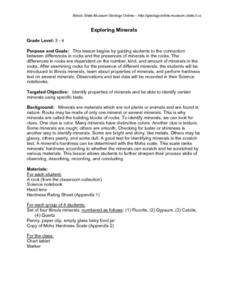Curated OER
Science Notebooks
Teachers can use science notebooks and other forms of writing to help students improve their understanding of scientific concepts.
Curated OER
Exploring Minerals
I love this geology lesson plan. Third and fourth graders look at the connections, and the differences, between rocks and minerals. Learners are charged with identifying specific rocks and minerals, learning how to properly use...
Project WET Foundation
The Water Cycle
Explore all things water cycle in a truly engaging interactive. Water enthusiasts look at water as a system. They label the parts of the water cycle as they learn about them in a hands on activity, and then participate in a game where...
National Wildlife Federation
Fish and Ladders: Grades 9-12
Swim with the big fish. Using a similar simulation as Fish and Ladders: Grade 5-8, pupils model the migration of Chinook salmon. A large group of the learners play the role of fish, while others are fishers, predators, and hazards....
University of Miami
What is it? Weathering, Erosion, or Deposition?
Just as rocks move through the rock cycle, your giddy geologists will move descriptions around until they are all in the correct category. After cutting out several types of rock movement, learners determine whether the action is...
Curated OER
4.2: Exploring Rocks
Students collect and look at rocks and write down information about them in science notebooks. They make comparisons and sort the rocks according to their properties, and then discuss their findings with their classmates and put them on...
Baylor College
Making Copies of an HIV Particle
In the second of five lessons about HIV, discover the mechanisms that allow the HIV virus to replicate. Using the models that they created the day before, learners examine the parts of the virus particle. The lesson plan does not say...
Curated OER
Investigating Mitosis in Allium Root Tip Squash
Preparing the root tip samples is the most challenging part of the mitosis-viewing lab found here, but the directions help ensure you have everything you need. There is no worksheet included; however, there is a sample data table....
Safe Drinking Water Foundation
Water Pollution
An introductory lesson to a unit on water pollution, young environmentalists are asked to brainstorm examples of pollutants in water. This lesson will help develop a sense of what water pollution is and where the pollutants come from.
Science Friday
Ugh, a Bug!
Young entomologists familiarize themselves with the physical characteristics of insects. Composed of two activities, each instructional activity involves your scientists tapping into their prior knowledge of bugs and making observations...
Sunburst Visual Media
Clouds
Support science instruction with a combination of engaging activities and skills-based worksheets that focus on clouds. Learners take part in grand discussions, write an acrostic poem, complete graphic organizers, solve word puzzles, and...
Project WET Foundation
Healthy Water Healthy People
People and water have something in common. They both need to be healthy. Explore with an engaging interactive what it means to have a healthy body and why having healthy water is also important.
Rainforest Alliance
Sounds of the Rainforest
Do you hear what I hear? Encourage scholars to use their listening skills and participate in a series of activities that demonstrate how the sense of hearing is crucial to the human and animal world. Activities guide learners on nature...
Project WET Foundation
The Blue Planet
What a neat interactive that interacts with the amount of water on Earth's surface. It begins with a brief audio introduction of the Blue Planet and how it got its name. Then, users click on the activity to play a game that calculates...
Project WET Foundation
Investigate Fresh Water
It's all about freshwater in this water interactive! Users navigate through freshwater habitats such as lakes, rivers, and wetlands, taking note of the animals that live there. They also look at a desert habitat for comparison. Learners...
Project WET Foundation
Use Water Wisely
What's the point in saving water? Surprisingly water isn't a forever resource because it is a natural resource. Here, young water conservationists hunt for 23 wise water users and water wasters by clicking on the people in the...
Project WET Foundation
We All Use Water
How many ways is water used? Indirect and direct water use are the two main ways humans use water, but the usage comes in many forms. Animals, agriculture, industries, transportation, and many more rely on water for different uses....
Teach Engineering
Paper Towers and Pool Balls Design Challenge
Those who build together learn together. Scholars work in groups on two teamwork-building activities that involve engineering design. They first construct the tallest tower they can using five sheets of paper and masking tape. Next, they...
Curated OER
Design a Pollinator
Students make a scientific drawing of a pollinator with at least five traits that make them well adapted to a given plant(s). They describe in their science notebook the adaptations that make their pollinator well suited to a given plant.
Curated OER
DNA Replication
High schoolers construct a 3-D model of DNA. They demonstrate an awareness of base pairs in written work and in a model. Students model DNA replication using edible materials. They record concluding thoughts in their science notebooks.
California Academy of Science
Kinesthetic Astronomy: Longer Days, Shorter Nights
A lamp, four globes, and some signs taped around the room are all you need to set up a solar system simulation for teaching how Earth's tilted axis creates the seasons. (Sticky dots are also needed, but not mentioned in the materials...
Science Matters
Thermal Energy Flow in Materials
The sun sends the earth 35,000 times the amount of energy required by all of us on the entire planet, every day. The fourth lesson in the 10-part series looks at how light energy from the sun transfers into thermal energy. Scholars build...
Curated OER
Energy
Scientific terms can be difficult to remember. This resource suggests developing analogies as a way to make energy terms memorable. After listing new terms on the board, groups develop analogies based on restaurant words, and then share...
Science 4 Inquiry
Let's Get Moving
Rivers top the list of causes of erosion over time. Scholars experiment with wind, water, and ice reshaping sand. They connect the simulations facts about erosion and deposition to understand unique landforms such as the Grand Canyon and...

























